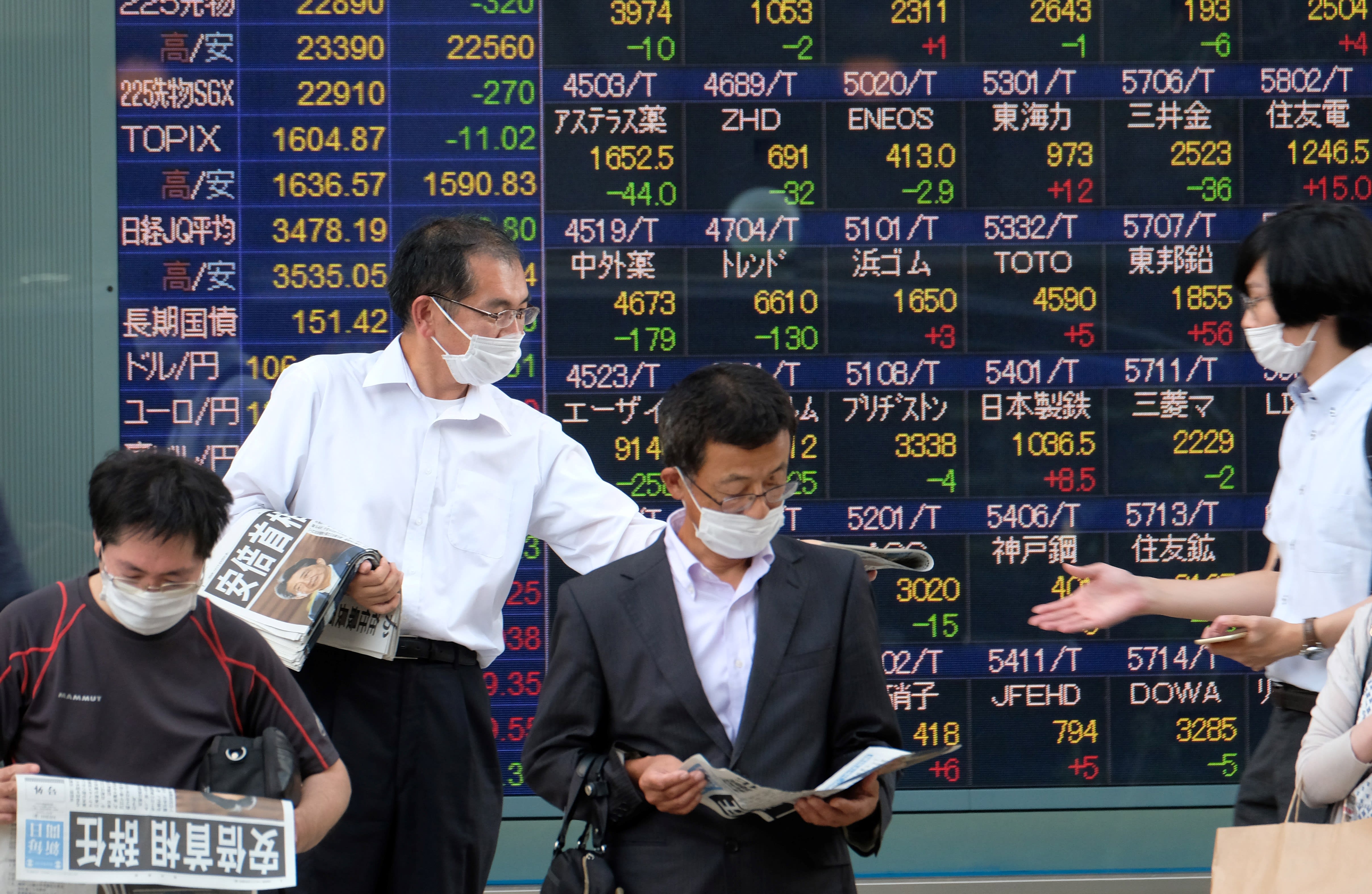
The surprise resignation of Japanese Prime Minister Shinzo Abe is unlikely to mark an end to so-called Abenomics stimulus policies, analysts told CNBC Friday.
Japan’s longest-serving premier on Friday confirmed his intention to step down due to worsening health. Abe has battled ulcerative colitis, a form of inflammatory bowel disease, for years but said his health started to deteriorate around the middle of last month.
Offering his apologies to the people of Japan, Abe said he would resign once the ruling Liberal Democratic Party had formally appointed a new leader.
As investors reacted to early reports of Abe’s departure, Japan’s Nikkei 225 index closed down 1.4%, while the Topix index ended 0.7% lower. The so-called “safe-haven” Japanese yen rose following confirmation of the news, last trading at 105.4 against the dollar.
‘Abenomics’: A mixed legacy
Since 2012, Abe has sought to revive Japan’s lackluster economy through a policy package dubbed Abenomics. He said Friday that the economic policy had succeeded in boosting jobs, and brought an end to 20 years of deflation.
Now, despite Abe’s departure, analysts expect a continuation of the country’s reflationary policies.
“The Abenomics framework and (Bank of Japan) monetary policy are likely to remain unchanged despite PM Abe calling it a day,” Peter McCallum, rates strategist at Mizuho International, told CNBC via email on Friday.
“We see little further upside for the Nikkei 225, and would not advise selling Japanese bonds on this news, although weakness in (Japanese Government Bonds) may persist until the new PM is in place.”
Pedestrins read an extra edition of Prime Minister Shinzo Abe’s resignation in fornt of an electronic quotation board displaying share prices from the Tokyo Stock Exchange in Tokyo on August 28, 2020.
KAZUHIRO NOGI | AFP via Getty Images
The U.S. dollar slipped 0.6% against a basket of major currencies on the news, weighed down by Abe’s announcement along with the prospect of lower interest rates for longer stateside.
“With a big job still left to do to pull Japan out of its Covid-19 induced recession, this is obviously a difficult time for a change in prime minister. But we would caution against thoughts that this will usher in some even easier policy from the Bank of Japan,” Robert Carnell, ING’s regional head of research for Asia-Pacific, said in a research note on Friday.
The Abenomics policy of massive fiscal, monetary support and economic reforms “may not have achieved all of its aims, but it wasn’t an unmitigated failure either, and Japan has made some important progress under his leadership,” Carnell said.
Critics of Abe’s signature economic policies argue the outgoing prime minister failed to make lasting changes to an economy weighed down by low productivity and an aging population.
Policies ‘still up in the air’
Abe, who had previously resigned as prime minister in 2007 following a flare-up of his medical condition, has served in the top job since his LDP party registered a landslide election victory in 2012.
His resignation will trigger a leadership race in the LDP, with the winner to be formally elected in parliament. Abe’s successor will serve for the rest of his term, with the country’s next general election set to take place during or before October 2021.
“We do not know who will succeed Mr. Abe in September, so clearly policies are still up in the air,” Martin Schulz, chief economist at Fujitsu Research Institute, told CNBC’s “Street Signs Europe” on Friday.
“But what we know is that the kind of Abenomics we had, with very, very strong quantitative monetary easing, with relaxed fiscal policy — even a big push of fiscal policy — and nitty, gritty small micro reforms will almost (with a) 100% likelihood continue,” he added.
“I don’t think that we will have a big reshuffle or any major structural reforms — that could also be a risk. So, there will be a continuation on that side (but) politically, we don’t know,” Schulz said, reflecting on a time before Abe in which prime ministers in Japan rapidly came and went.
Successor should win a ‘comfortable majority’
Looking at broader Asian markets, South Korea’s Kospi index and Hong Kong’s Hang Seng index both closed slightly higher on Friday.
Chinese stocks led gains among the region’s major markets on Friday, with the Shanghai composite up 1.6% while the Shenzhen component gained 2%.
“The economic implications are small,” Tom Learmouth, Japan economist at Capital Economics, said in reaction to Abe’s decision to step down.
He agreed that “Abenomics” was always “likely to end in name only” when Abe stood aside, given that his successor was expected to come from within the ruling LDP party.
“With public support for his cabinet at record lows, Mr. Abe was unlikely to push for a fourth term as LDP leader past September next year anyway,” Learmouth said in a research note.
“And given the weak and fragmented opposition, his successor as LDP leader and PM should be able to win a comfortable majority at the next general election.”
Source: CNBC
